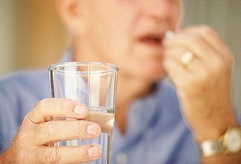-
General Health Conditions







Heart Disease
Heart disease is a common term for coronary artery disease (CAD). It is the number one cause of death in the U.S. in both men and women. With heart disease, arteries that supply blood to the heart become hardened and narrowed. Heart disease can lead to these problems:
-
•Angina. With this, the heart muscle does not get as much blood and oxygen as it needs for a given level of work. A heart attack damages the heart muscle. Angina does not. It is a warning sign that a heart attack could occur, though.
-
•Heart failure (HF). With this, the heart “fails” to supply the body with enough blood and oxygen for its needs. This develops slowly. It becomes chronic.
Metabolic Syndrome is a group of all of the factors listed below in one person. This makes the risk for heart disease and death very high. It increases the risk for diabetes and stroke, too.
-
•Abdominal obesity. This is a waist measurement: > 40 inches for men. > 35 inches for women.
-
•Insulin resistance.
-
•High blood sugar and triglycerides.
-
•High blood cholesterol.
-
•High blood pressure.
Signs & Symptoms
-
•Symptoms of angina are pain, discomfort, or a squeezing pressure in the chest. Aching in a tooth, jaw, or neck can also occur. Symptoms usually go away with rest and/or nitroglycerin. Angina attacks may occur with anger, excitement, or exertion, such as walking up a hill.
-
•Symptoms of heart failure are: Shortness of breath; feeling very tired or weak; swelling in the lower legs, ankles, and feet; dry cough or one with pink, frothy mucus; rapid weight gain; and a fast heart beat.
Causes
Heart disease is caused by atherosclerosis. This is the buildup of plaque in the inner walls of the arteries. The plaque is made up of blood platelets, cholesterol, fibrous tissue, and sometimes calcium. The plaque narrows the arteries. This slows or blocks the flow of blood to the heart. Some factors increase the risk of heart disease. The more risk factors; the higher the risk.
Risk Factors That Can’t Be Changed
-
•A past heart attack or stroke.
-
•Family history of heart disease:
-
-A father or brother had heart disease before age 55.
-
-A mother or sister had heart disease before age 65.
-
•Being a male 45 years or older.
-
•Being a female 55 years or older.
Risk Factors That Can Be Controlled
-
•Smoking.
-
•Being overweight or obese.
-
• Lack of physical activity.
-
• Having diabetes and high blood cholesterol.
-
•Using cocaine or amphetamines.
-
•Metabolic syndrome.
Other Factors that May Play a Role in Heart Disease
-
•Waist measurement > 40 inches for men; > 35 inches for women.
-
•C-reactive protein (CRP) in the blood. Levels of CRP rise when there is inflammation in the body.
-
•Elevated blood homocysteine levels.
-
•Infections, such as chlamydia pneumoniae.
-
•Elevated blood lipoprotein (a).
-
•Elevated blood triglycerides.
Take medicines as prescribed.










Get your doctor’s advice on taking vitamin and other supplements.

Treatment
The goals of treatment are to relieve symptoms, control or reduce risk factors, stop or slow further damage to the arteries, and prevent and treat cardiac events. Treatment includes:
-
•Self-Care / Prevention measures below.
-
•Medications.
-
•Procedures to open blocked or narrowed arteries or bypass them.
-
•Cardiac rehabilitation (rehab).
Questions to Ask

-
•Manage stress. Practice relaxation techniques.
-
•If you drink alcohol, do so in moderation. Too much alcohol can raise the risk for high blood pressure, heart disease, stroke, and other health problems. Moderate drinking, may be linked to a lower risk of coronary heart disease in some persons. Moderation means no more than 2 drinks a day for men; 1 drink a day for women and persons age 65 and older. One drink = 4 oz. of wine; 12 oz. of beer; or 1-1/2 oz. of 80 proof liquor.
-
•Ask your doctor how much, if any, alcohol you should drink.
-
•Get your doctor’s advice about taking vitamins, minerals, and herbal products.
Self-Care / Prevention
-
•Have regular medical checkups. Get your blood pressure checked at each office visit or at least every 2 years. Get your blood cholesterol tested, as advised by your doctor.
-
•Don’t smoke. If you smoke, quit.
-
•Get to or stay at a healthy weight.
-
•Take all medications as prescribed.
-
•Ask your doctor about the benefits and harms of aspirin therapy (e.g., 1 baby aspirin daily).
-
•Watch for signs of diabetes. See your doctor if you have any.
-
•Follow a diet low in saturated fats, trans fats, and cholesterol. Limit sodium to 1,500 to 2,400 milligrams per day. Follow the DASH Eating Plan.
-
•Get regular exercise. Follow your doctor’s advice.
Do angina symptoms not respond to prescribed medicine or fail to go away in 10 to 15 minutes?
Does severe shortness of breath (with or without wheezing) occur in a person with heart failure?
Does a person with heart failure have any of these problems?
-
•Unexplained weight gain of 3 to 5 pounds.
-
•Mild shortness of breath and a cough with pink or frothy mucus.
-
•The flu or a cold.
-
•Heart failure symptoms get worse.
Do any of these problems occur?
-
•Chest pain with exertion and the pain goes away with rest.
-
•Shortness of breath or fatigue when doing normal activities or when lying down.
-
•Swelling in the legs or ankles. Shoes can feel too tight all of a sudden.
Is any heart attack warning sign present?




Get more information from:
HealthyLearn® | www.HealthyLearn.com. Click on MedlinePlus®.
The American Heart Association | 800.242.8721 | www.americanheart.org
National Heart, Lung, and Blood Institute (NHLBI) | 800.251.1222 | www.nhlbi.nih.gov




Copyright © 2009, American Institute for Preventive Medicine. All rights reserved.